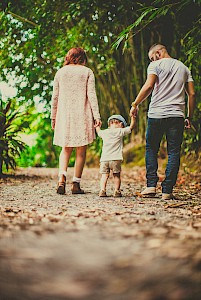Going for a walk is one of the simplest things you can incorporate into your daily schedule. Most of us know about the benefits it brings to our physical and mental health. Today, we will take it a step further and learn to maximise our time during our daily walks to help our children build their speech, language and social skills.

What could we do?
1. Have a conversation with our child
Pay attention to what your child is interested in and comment on what’s happening or what he sees. He might have something to say about what’s happening but might not have the words to tell about what he sees or the skills to form complete sentences, so this is a good chance to provide a language model.
We can talk about what is happening and make comments.
“We’re going to walk to the park! What should we do at the park today? The last time we were at the park, we saw a big fluffy dog and we played with it!”
“Look at the birds! They’re building a nest!”
This exposes your child to a variety of words like names of objects, action words and describing words. It also serves as a model for correct use of grammar, i.e. using pronouns (we, I, you), using past, present and future tenses.
2. Play “I spy”
When playing “I spy” you can provide different types of hints to your child.
You could give hints associated with:
- Item category (e.g. A clothing item that you wear on your hands)
- Appearance/ characteristic – colour, texture, size, material (e.g. Something that is green and has spikes on it)
- Function and action words (e.g. Something that you use to boil water)
- Sounds at the start or at the end of words (e.g. Something that starts with an /s/ sound)
- Rhyme (e.g. Something that rhymes with the word “call” – ball)
If your child is beginning to form short sentences, you could encourage them to ask questions with support from your language model, “Is it small? Is it a living thing? Do you play with it?”.
By getting your child to take turns in this game, you could build skills in turn taking and even use this opportunity to model correct pronoun use, “It’s my turn!” “It’s your turn now!”
3. Revise speech sounds
Practising speech sound during your daily walk may help your child to generalise the speech sounds they’ve learned in therapy into their everyday life. During your walk, take a look at your surrounding and see if you can name something that starts /ends with a sound your child has been practising.
“I can find something that starts with a /s/ sound, the ‘sea’! Let’s say it 5 times!”
4. Greet and be friendly
Make sure to help your child practise social skills by encouraging him to greet others or respond to greetings from others. You could encourage your child to:
- Look at the other person he is talking to another person
- Smile
- Say “Hello”, “Good morning’ and ask about their day
This encourages your child to be more independent in social interactions instead of relying on you to speak to less familiar people.
Related Blog Posts
If you liked this post you may also like:
Mild difficulties?
Using PUPPY PLAYTIME To Grow
Dinnertime - Supporting Your Child's Development
10 speech tips



